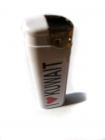Cerium
One of the properties of pure cerium is that it will ignite when it's scratched with a sharp object. It's present in the ‘flint’ of this lighter in a safer form as a component of 'misch metal'.
Large deposits of cerium is processed from ore deposits in mozanite on the beaches of Travancore in India, and river sands in Brazil as well as in allanite in the Western United States and in China, where a company called Jiangxi Metals Co., Ltd in Shanghai supplies quantities internationally for use in lighters as well as ‘boy scout’ camping flints.
The cerium in this particular lighter found its way to Brixton from Kuwait as a present from an artist who also occasionally works as a painter and decorator for the well-heeled in Dubai and Kuwait.
Cerium is also used as a catalyst to refine the petroleum that makes its way from Kuwait to the petrol forecourts of England.
Kuwait’s oil reserves are believed to make up approximately 10% of the world’s supply. The oil industry was nationalised in the 1970’s, and oil sovereignty is seen as a key issue in Kuwait as it accounts for about half the country's gross domestic product and 80 percent of government income.
Kuwait has the world’s second largest oilfield, Burgan, which accounts for more than half of its production, but which, since 2005, is believed to be in terminal decline.
Until the Iraqi invasion of Kuwait in 1990, foreign workers outnumbered the domestic population. Kuwait’s small population, together with the traditionally low participation of women in the workplace (prior to 2005 women didn’t have a right to vote), meant it has traditionally relied on a large foreign workforce.
‘Project Kuwait’ is the name of a long-standing controversial plan put before the country’s parliament that would allow international oil companies power over Kuwait's oil production levels. It would also give the oil giants much greater influence over global oil supplies and pricing once they regained a foothold in the country. The backers of the plan argue that the IOC’s have the technical know-how to help stretch out what remains of oil supplies and develop what's yet to be discovered, and that the limited handing over of state control is a price worth paying.
The plan was initially seen as a political tool to win Western support for protecting Kuwait's northern border with Iraq. The four fields the project plans to develop - Abdali, Rawdhatain, Ratqa, and Sabriyah - lie very close to the Kuwait-Iraq border.
In 1990 Abdali was at the centre of Iraqi accusations that Kuwait was "horizontal drilling" and sucking out Iraqi reserves.
This ‘slant’ drilling, together with a policy of price-lowering overproduction during the summer of 1990 have been cited by some analysts as one of Saddam Hussein's main motivations in invading Kuwait as a way of punishing its ruling al-Sabah family.
